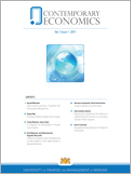The Moderating Role of Social Norms on Tax Compliance Model: A Laboratory Experimental Evidence in Indonesia
The Moderating Role of Social Norms on Tax Compliance Model: A Laboratory Experimental Evidence in Indonesia
Author(s): Nur Cahyonowati, Dwi Ratmono, Agung JuliartoSubject(s): Socio-Economic Research
Published by: Akademia Ekonomiczno-Humanistyczna w Warszawie
Keywords: audit; fines; social norms; tax compliance;
Summary/Abstract: This study aims to examine the role of social norms in increasing tax compliance. The traditional model of tax compliance predicts that audits and tax fines are the determinants of tax compliance. This study proposes that social norms would strengthen the effect of the economic factors (i.e., audits and penalties) on tax compliance behavior. Social norms regard tax fraud as incorrect behavior. From an economic perspective, taxpayers consider the social norms because violations of the tax rules bring social pressures that have an economic impact on the perpetrators of tax fraud. This study uses an experimental laboratory method with a 2x2 between-subjects factorial design. Our final sample consisted of 198 subjects. This study provides empirical evidence that social norms strengthen the effect of tax fines, hence improving tax compliance. However, this study fails to provide empirical evidence that social norms enhance the effect of the probability of being audited and thus enhance tax compliance. This study contributes to the recent literature about non-standard motivations for tax compliance. Theoretically, this study implies that the standard model of tax compliance is not enough to explain taxpayer compliance behavior. This study also suggests the importance of developing social norms to the policymakers.
Journal: Contemporary Economics
- Issue Year: 16/2022
- Issue No: 4
- Page Range: 410-423
- Page Count: 14
- Language: English

